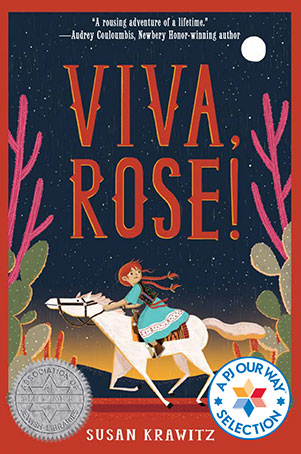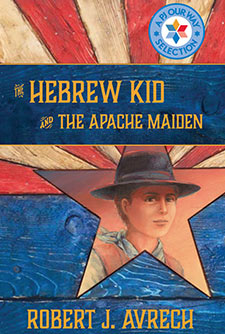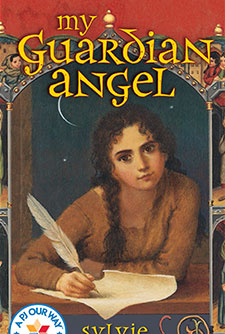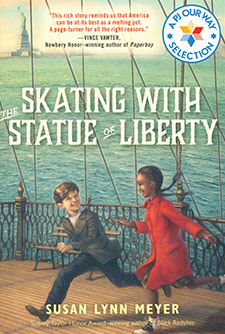Viva, Rose!
What’s a nice Jewish boy doing with a band of outlaws? When Rose sees her brother’s picture in the paper, she knows he’s definitely not in Brooklyn! Can Rose find Abe and bring him back before their parents find out the truth?
Average Rating
( hint: Login to leave a review! )
94 Reviews
Leave Review
What the Book Is About
Jewish Content & Values
Positive Role Models
Content Advisory
Talk It Over
More for You
What the Book Is About
When 13-year-old Rose discovers that her brother Abe hasn’t gone off to be a cowboy as he’d said, but instead has become “a low-life bandit,” she is furious and writes to him demanding that he come home immediately. But while delivering the letter, Rose is kidnapped and brought to the camp of the Mexican revolutionary Pancho Villa. While she is held captive, she looks after spoiled, lonely Dorotea, learns to ride a horse, and learns about the Mexican people’s struggle for freedom from oppression.
Jewish Content & Values
- Rose’s father is El Paso’s kosher butcher and cantor. Their family speaks Yiddish and hosts new immigrants from the Russian Empire while they are getting settled in their new country.
- Rose and her mother prepare a seder for Passover, making matzah and charoset.
- Abe and Rose have a makeshift seder in the desert, using watercress, tortillas, and sangria to stand in for the bitter herb, matzah, and wine. Abe says the bracha (blessing) over the wine. Afterwards, Rose explains the story of Passover to the little Mexican girl, Dorotea.
Positive Role Models
- Rose sets off to bring Abe home because she thinks her parents will be very upset if they find out the truth about where he has really gone. In Mexico, she keeps kosher as best she can, refusing to drink milk with a meat meal even though she is keeping her Jewish identity a secret.
- Papa is understanding when he discovers that Abe and his brother Eli have lied to them and that Abe has not gone to Brooklyn. He realizes that his sons were trying to protect their parents from worrying and accepts that Abe has a different path in life than the one his parents want for him.
- Although Abe lies to his family about his whereabouts, he has left in order to help the Mexicans overcome the oppression they have been subjected to by the wealthy ruling class. He puts his commitment to justice ahead of his family and his hopes for his own future. On his travels, Abe tries to keep kosher as much as possible, not eating bread during Passover, not mixing milk and meat, and never eating pork.
Content Advisory
Much of the story is set in a revolutionary’s army camp, so the men carry guns as per the time period. It is implied that Villa’s followers have killed people, although this is not made explicit in any detail. Both Rose and Abe lie to their parents.
Talk It Over
Rose is furious with her brother for lying about where he was going and takes it upon herself to bring him home. Do you think she did the right thing, or should she have told her parents?
More for You
Abe and Rose hide their Jewish identity for much of the book, but at the time of the Mexican revolution, there were some Jews living in the country. In 1900, the Mexican census counted 134 Jews. Turkish Jews began holding open religious services in 1901 and founded the first Talmud Torah in 1905, while Ashkenazi Jews began holding services in 1904. The first formal Jewish organization in Mexico, the Monte Sinaí community, was founded in 1912. Many Jews left the country during the revolution but started coming again in large numbers soon afterwards.
What the Book Is About
What the Book Is About
When 13-year-old Rose discovers that her brother Abe hasn’t gone off to be a cowboy as he’d said, but instead has become “a low-life bandit,” she is furious and writes to him demanding that he come home immediately. But while delivering the letter, Rose is kidnapped and brought to the camp of the Mexican revolutionary Pancho Villa. While she is held captive, she looks after spoiled, lonely Dorotea, learns to ride a horse, and learns about the Mexican people’s struggle for freedom from oppression.
Jewish Content & Values
Jewish Content & Values
- Rose’s father is El Paso’s kosher butcher and cantor. Their family speaks Yiddish and hosts new immigrants from the Russian Empire while they are getting settled in their new country.
- Rose and her mother prepare a seder for Passover, making matzah and charoset.
- Abe and Rose have a makeshift seder in the desert, using watercress, tortillas, and sangria to stand in for the bitter herb, matzah, and wine. Abe says the bracha (blessing) over the wine. Afterwards, Rose explains the story of Passover to the little Mexican girl, Dorotea.
Positive Role Models
Positive Role Models
- Rose sets off to bring Abe home because she thinks her parents will be very upset if they find out the truth about where he has really gone. In Mexico, she keeps kosher as best she can, refusing to drink milk with a meat meal even though she is keeping her Jewish identity a secret.
- Papa is understanding when he discovers that Abe and his brother Eli have lied to them and that Abe has not gone to Brooklyn. He realizes that his sons were trying to protect their parents from worrying and accepts that Abe has a different path in life than the one his parents want for him.
- Although Abe lies to his family about his whereabouts, he has left in order to help the Mexicans overcome the oppression they have been subjected to by the wealthy ruling class. He puts his commitment to justice ahead of his family and his hopes for his own future. On his travels, Abe tries to keep kosher as much as possible, not eating bread during Passover, not mixing milk and meat, and never eating pork.
Content Advisory
Content Advisory
Much of the story is set in a revolutionary’s army camp, so the men carry guns as per the time period. It is implied that Villa’s followers have killed people, although this is not made explicit in any detail. Both Rose and Abe lie to their parents.
Talk It Over
Talk It Over
Rose is furious with her brother for lying about where he was going and takes it upon herself to bring him home. Do you think she did the right thing, or should she have told her parents?
More for You
More for You
Abe and Rose hide their Jewish identity for much of the book, but at the time of the Mexican revolution, there were some Jews living in the country. In 1900, the Mexican census counted 134 Jews. Turkish Jews began holding open religious services in 1901 and founded the first Talmud Torah in 1905, while Ashkenazi Jews began holding services in 1904. The first formal Jewish organization in Mexico, the Monte Sinaí community, was founded in 1912. Many Jews left the country during the revolution but started coming again in large numbers soon afterwards.




